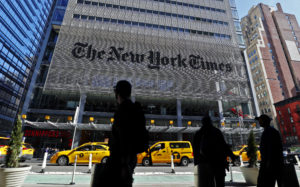In the story America tells about 9/11, the attack was a tragedy, but a tragedy that united the nation. “We were able to come together as a country at that terrible time; we put aside differences,” said Hillary Clinton on Sunday, the 21st anniversary. “I wish we could find ways of doing that again.”
Like the rest of America’s ruling class, Clinton fears we are hopelessly divided, possibly forever. The media tends to agree. Books and op-eds are churned out, hyping everything from the “polarisation spiral” to predictions of a coming civil war. We are past the point of no return, pundits warn. Apparently even scholars of polarisation are polarised, according to the New York Times. As Tiffany Cross put it on her MSNBC show a few weeks ago: “People keep saying a civil war is coming. I would say a civil war is here. And I don’t mean to be hyperbolic.”
The trouble it is, it is hyperbolic. It’s true that our political and media elites, and those who run corporations and Big Tech companies, are increasingly partisan. But that’s because they have a lot to gain — in terms of money and power — from making Americans hate each other. Nevertheless, despite the billions and billions of dollars being spent trying to divide us, polarisation remains an elite phenomenon. When it comes to the fundamental values this nation was founded on, Americans are much more united than they are divided.
The evidence is everywhere. Last week, for instance, Gallup reported the latest approval rating for interracial marriage between black and white people. The polling company first started asking Americans about their feelings on the subject in 1958, when approval was an abysmal 4%. As of 2022, it stands at 94%, and there is almost no difference between white and non-white respondents. The regional difference has also evaporated. Southern Americans now approve of interracial marriage at the same rate as their eastern, Midwestern, and western neighbours. As recently as 1991, approval for interracial marriage in the south was at just 33%, compared to 54% in the east and 60% in the west. Today, those figures are 93%, 94%, and 97% respectively.
You could argue that people haven’t become less racist, but simply less willing to admit their racism to pollsters. But even that is a huge leap forward. 93% of Southern Americans want pollsters, and presumably also their neighbours, to believe that they have the same views as the liberals they probably mocked just 20 years ago. Racism has become socially taboo.
Something similar has happened with gay marriage. Approval among Republicans has absolutely soared in recent years — from 16% in 1995 to 55% last year, including 61% of young Republicans. Many believe that at least ten Senate Republicans will join the Democrats in enshrining the right to gay marriage into law. At a time of intense polarisation — when even baby formula divides the house — this is a major feat.
And then there’s abortion, an issue that the media and our politicians assume is hugely divisive. In fact, the vast majority of Americans agree on the major points. They oppose abortion bans and want it to be generally legal in the first trimester, and in cases of rape, incest or where the mother’s health is threatened. On criminal justice, too, there is no longer a partisan divide. In recent years, Republicans have been at the forefront of criminal justice reform. Red states like Oklahoma, Georgia and Idaho have been quietly releasing prisoners and reforming their justice systems for the better part of a decade. Supreme Court justice Neil Gorsuch has consistently sided with liberal judges in criminal justice cases. And President Trump’s First Step Act released 5,000 black men from prison, although those men seem to be the only ones who took any notice.
Even when it comes to police brutality, Republicans have been becoming more vocal. In the wake of George Floyd’s murder in 2020, the South Carolina Senator Lindsey Graham announced he was seeking proposals to improve policing and combat “racial discrimination regarding the use of force”. Soon after, Senator Tim Scott, the only black Republican senator, introduced a police reform bill — which was later killed by Democrats.
Scott and Graham were joined by none other than the then-leader of the Republican Senate majority, Mitch McConnell, who told reporters in the wake of Floyd’s murder: “We are still wrestling with America’s original sin. It is perfectly clear we are a long way from the finish line.” And at a lunch for Republican senators, Tom Cotton of Arkansas stood up and said: “Young Black men have a very different experience with law enforcement in this nation than white people, and that’s their impression and experience, and we need to be sensitive to that and do all we can to change it.”
Meanwhile, the most vocal Democrats on the subject are those who support progressive prosecutors and bail reform efforts — policies often billed as divisive. But they are not divisive; they are just wildly unpopular — like Republican efforts to ban abortion in all cases. Democrat and Republican Americans alike oppose these measures, especially now, amid a crime wave. Our elites want us to believe these issues divide Americans, but they simply don’t.
The Pew Research Center recently released a study that they claimed showed signs of “partisan hostility” growing. “Growing shares of both Republicans and Democrats say members of the other party are more immoral, dishonest, closed-minded than other Americans,” the study claimed to find. But the questions they asked respondents weren’t about members of the other party as much as they were about the parties themselves, or politicians: “Do you have a favourable or unfavourable opinion of the Republican Party, or the Democratic Party?”; “How well do each of the following phrases describe the Republican or Democrat Party?”; “How much do you like or dislike Republican or Democrat political leaders who…” People aren’t turning on their fellow Americans so much as they are on political parties and leaders.
And it’s not just this study that suggests so; a 2019 study by James Druckman and Matthew Levendusky in Public Opinion Quarterly found that “when answering questions about the other party, individuals think about elites more than voters”. When the elites of the party were separated out from average Americans, the researchers found that on every measure, “respondents are more negative toward the elites of the other party than they are toward voters”. And Anthony Fowler, a professor of Public Policy at the University of Chicago, has done numerous studies that fly in the face of the polarisation narrative, finding that voters are more moderate, more informed by policy, and more willing to change their views than many in power would have you to believe. “To be sure, there are real policy disagreements among Americans,” writes Fowler. “But for every extreme liberal or conservative who agrees with their party on most issues, there are far more people in the middle who think that Nancy Pelosi is too far to the Left and that Mitch McConnell is too far to the Right.”
Every week, I talk to working-class Americans across the country who work with people who disagree with them on politics. They tell me the same thing over and over: we don’t have the luxury of hating co-workers who vote for the other party. We rely on them too much. Party politics just doesn’t matter as much as having a good working relationship. It’s our elites who want us to believe that we are divided, simply because it benefits them.
It’s clear how this works in politics: if you can convince you constituents that the person you’re running against is a fascist — or a groomer — then the race is over. Because if the choice is you or Hitler, you pretty much have it in the bag. And if you can also convince people that your opponents’ supporters and voters are fascists and deplorables, who cling to their guns and their Bibles and their bigotries, well, who wants to be in that category? Divisiveness in politics is a shortcut — a workaround to actually having to deliver the promises you make your constituents.
Something similar has happened to the mainstream media. With the collapse of the local newspaper industry, a new business model has emerged that is diametrically opposed to the goal of getting the widest circulation. The business incentives of digital media see success in terms of engagement rather than circulation or ad revenue, and the tools of digital media make it possible to target content to specific audiences based on income and zip code. Online publishing software tells you exactly what these audiences are clicking on, how often, and for how long — so you can give readers more and more and more of it. Of course, the most engaged readers online are always the most extreme, which means that our news outlets gain most by catering to them.
Social media companies work in a similar way. The currency there is attention, and the stronger you feel about something, the longer you stay on a page dedicated to it, and the more likely you are to click on an ad. Every time you hate a stranger on the internet, someone makes money.
At a time when the death of Elizabeth II is uniting her nation in grief, it’s hard to watch our own head of state fall into this trap. President Biden — who campaigned on unifying the country, and promised to represent not only those who voted for him but also those who did not — has made a habit of casting his political opponents as extremists. Recently, for instance, he has smeared MAGA Republicans as “semi-fascists” and a threat to democracy. Not exactly the behaviour of a unifier.
The thing that was miraculous about the response to 9/11 was not that Americans united, because we were not divided. It’s that our leaders did: they showed the grace that ordinary Americans show every single day, working alongside each other in nursing homes in Florida and factories in Iowa and construction sites in Minnesota. For once, our leaders were worthy of our support. For once, they were representing us. Today, by contrast, they simply demand that we defend them — to the extend that it means indulging in meaningless fantasies about a looming civil war.
Disclaimer
Some of the posts we share are controversial and we do not necessarily agree with them in the whole extend. Sometimes we agree with the content or part of it but we do not agree with the narration or language. Nevertheless we find them somehow interesting, valuable and/or informative or we share them, because we strongly believe in freedom of speech, free press and journalism. We strongly encourage you to have a critical approach to all the content, do your own research and analysis to build your own opinion.
We would be glad to have your feedback.
Source: UnHerd Read the original article here: https://unherd.com/






